 MyDogBreeds
MyDogBreeds Spanish Water Dog is originated from Spain but Cao Fila de Sao Miguel is originated from Portugal. Spanish Water Dog may grow 11 cm / 4 inches shorter than Cao Fila de Sao Miguel. Spanish Water Dog may weigh 19 kg / 41 pounds lesser than Cao Fila de Sao Miguel. Both Spanish Water Dog and Cao Fila de Sao Miguel has almost same life span. Both Spanish Water Dog and Cao Fila de Sao Miguel has almost same litter size. Spanish Water Dog requires Moderate maintenance. But Cao Fila de Sao Miguel requires Low maintenance
Spanish Water Dog is originated from Spain but Cao Fila de Sao Miguel is originated from Portugal. Spanish Water Dog may grow 11 cm / 4 inches shorter than Cao Fila de Sao Miguel. Spanish Water Dog may weigh 19 kg / 41 pounds lesser than Cao Fila de Sao Miguel. Both Spanish Water Dog and Cao Fila de Sao Miguel has almost same life span. Both Spanish Water Dog and Cao Fila de Sao Miguel has almost same litter size. Spanish Water Dog requires Moderate maintenance. But Cao Fila de Sao Miguel requires Low maintenance
 Bred in Spain to guard and herd sheep, the Spanish Water Dog was also used in hunting because he could retrieve in water. The breed is closely aligned with other water dogs like the Irish Water Spaniel, Portuguese Water Dog and French Barbel. It is especially true that the Spanish Water Dog and the Portuguese Water Dog share some of the same ancestors. The two breeds are closely related.
Bred in Spain to guard and herd sheep, the Spanish Water Dog was also used in hunting because he could retrieve in water. The breed is closely aligned with other water dogs like the Irish Water Spaniel, Portuguese Water Dog and French Barbel. It is especially true that the Spanish Water Dog and the Portuguese Water Dog share some of the same ancestors. The two breeds are closely related.
In the early days of the breed, they were separated into three different sizes and types. The dogs from Northern Spain were smaller than the others and came from the regions of Cantabria and Asturias. These lighter colored dogs eventually became their own breed – the Cantabria Water Dog. The second group came from western Andalusia marsh lands. He had a long chorded coat. The third group was the strongest and largest and came from the southern Andalusian sierras. This was by far the largest and most influential group, most of whom were herders. Eventually the groups interbred and today’s SWD carries the traits of all three. They were and still are a very versatile breed. In addition to herding they fished or retrieved for hunters.
The breed was revived in the 1970”s by two breeders, Santiago Montesinos and Antonio Garcia Perez travelled through southern Spain to buy or borrow dogs for breeding. By 1980, they had established the Spanish Water Dog Club of Spain and reestablished the breed. They fought to the breed recognized in Spain first. After five years of hard work, the Federation Cynologique Internationale recognized the breed permanently in 1999.
The UKC, or United Kennel Club, of the United States, recognized the breed in 2001, accepting them for confirmation by 2004. In the United States the breed was championed by Ken and Jerry Mann to attain that UKC recognition. Still the AKC, or American Kennel Club, held out on their recognition. The Manns showed the SWD in 2000 in the AKC Rare Breed Conformation and the UKC multi-breed show in 2004.
The Manns also used their breed for herding in the United States in entered them into the herding competition. In the they advocated for and got the SWD into the herding group for confirmation with the UKC in 2013. The American Kennel Club approved the requests of the Spanish Water Dog Club, Inc and recognized the breed in 2005 as foundation stock. By 2008 the AKC recognized the SWD to be able to compete in field trials by not conformation. In 2015 the SWD will be admitting to AKC conformation and fully recognized as a member of the herding group. They were also recognized by the American Herding Breed Association in 2007.
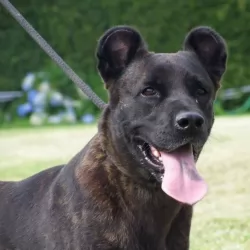 This Molosser type dog originated on Sao Miguel Island in the Azores, a region of Portugal. Known also as the Sao Miguel Cattle Dog or the Azores Cattle Dog, the existence of the Cao Fila de Sao Miguel has been documented since early in the 19th century.
This Molosser type dog originated on Sao Miguel Island in the Azores, a region of Portugal. Known also as the Sao Miguel Cattle Dog or the Azores Cattle Dog, the existence of the Cao Fila de Sao Miguel has been documented since early in the 19th century.
The dog has always been used as a cattle dog but today it remains rare outside of Portugal. In was in 1984 in Portugal that the first written breed standard was published in Portugal. The Cao Fila de Sao Miguel then earned recognition with the Portuguese Kennel Club.
 The Spanish Water Dog is an athletic, medium size, robust breed that is not as tall as it is long. In countries like the US, the tails are docked but it is not a conformation fault if they are not. The carry themselves with pride and elegance, have a strong head and expressive eyes which are brown. They have flat skulls and wide set eyes. Their paw pads, eye-rims and nose should be darker than their coat or at least the same color. Their eyes are chestnut, hazel or dark brown and their ears are medium height and triangular. His coat is curly and his topline is straight. With a broad chest and arched rib, he is a very athletic looking dog. The breed has much respiratory capacity with broad shoulders and straight sturdy legs. The breed has rounded feet , tight toes, and resistant pads.
The Spanish Water Dog is an athletic, medium size, robust breed that is not as tall as it is long. In countries like the US, the tails are docked but it is not a conformation fault if they are not. The carry themselves with pride and elegance, have a strong head and expressive eyes which are brown. They have flat skulls and wide set eyes. Their paw pads, eye-rims and nose should be darker than their coat or at least the same color. Their eyes are chestnut, hazel or dark brown and their ears are medium height and triangular. His coat is curly and his topline is straight. With a broad chest and arched rib, he is a very athletic looking dog. The breed has much respiratory capacity with broad shoulders and straight sturdy legs. The breed has rounded feet , tight toes, and resistant pads.
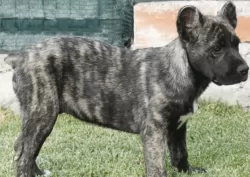 The Cao Fila de Sao Miguel is a medium to large sized dog standing 50 – 61cm in height and weighing 25 – 41kg. As with all molossers, the dog has powerful jaws.
The Cao Fila de Sao Miguel is a medium to large sized dog standing 50 – 61cm in height and weighing 25 – 41kg. As with all molossers, the dog has powerful jaws.
This dog breed has muscular limbs and dark brown eyes. The ears are normally docked into a rounded shape much like that of the Hyena. The tail has always been docked at the 2nd or 3rd vertebra but these days with regulations surrounding docking, the tail is unfortunately left long.
The coat of the Cao Fila de Sao Miguel is short and smooth while the hair on the tail and thighs is a bit longer. The Cao Fila de Sao Miguel is always brindled, and comes in shades of fawn, brown, gray or black. A white mark on the forehead around the chest or on the paws is also often seen.
The Cão de Fãila de São Miguel is a working dog who is used to guarding livestock. He is an athletic dog, game for plenty of action, and he will require plenty of daily exercise. He is territorial and makes an excellent guard dog, but even so, when it comes to his own owner and human family, he is gentle and loving.
The Cao de Fila de Sao Miguel is an intelligent dog and he will need training and socialization which allows him to get on well with children in the home as well as other pets.
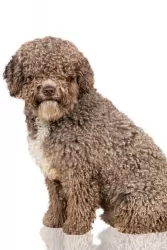 3.Adaptability - very adaptable with the right exercise. Neither heat nor cold bother them.
3.Adaptability - very adaptable with the right exercise. Neither heat nor cold bother them.
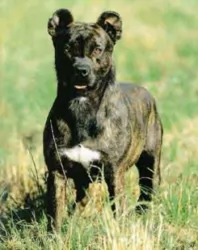 The Cão de Fila de São Miguel is a natural guard dog who will love and guard his family. With training and socialization he can become a devoted and gentle family dog with children and with other pets. They can be aloof with strangers.
The Cão de Fila de São Miguel is a natural guard dog who will love and guard his family. With training and socialization he can become a devoted and gentle family dog with children and with other pets. They can be aloof with strangers.
The Cão de Fila de São Miguel is an active dog who wants to be busy, and he is therefore better suited to country living rather that in a small home where space is limited.
Intelligent, a fast learner, protective and territorial, the Cão de Fila de Sao Miguel is an aggressive, hardy working breed who is also an excellent guard dog and protector. With firm training he becomes loyal, lovable and devoted – an ideal family companion.
 The Spanish Water Dog has much of the same health problems as the other water dogs and dogs their size and heritage. Here are some of the health issues they are prone to.
The Spanish Water Dog has much of the same health problems as the other water dogs and dogs their size and heritage. Here are some of the health issues they are prone to.
• Exocrine Pancreatic Insufficiency – inability to digest food – can be treated.
• CHG – Congenital Hypothyroidism with Goiter – inherited and pups don’t grow correctly.
• Neuroaxonal Dystrophy – cognitive and muscular dysfunction. Vitamin E and insulin deficiency
 The Cao Fila de Sao Miguel is a dog who enjoys exceptional health. When you do research you see there aren’t really any particular illnesses plaguing this dog, and he can actually live to be 15 years of age. Be aware of some illnesses as they are common among different dog breeds – hip- and elbow dysplasia, bloat, eye diseases such as progressive retinal atrophy and cataracts, heat intolerance and arthritis.
The Cao Fila de Sao Miguel is a dog who enjoys exceptional health. When you do research you see there aren’t really any particular illnesses plaguing this dog, and he can actually live to be 15 years of age. Be aware of some illnesses as they are common among different dog breeds – hip- and elbow dysplasia, bloat, eye diseases such as progressive retinal atrophy and cataracts, heat intolerance and arthritis.
This is a dangerous illness that can affect any dog – small or large. This is when the dog’s stomach fills with fluid or gas so that it expands. The stomach then puts pressure on other organs and your dog can have trouble breathing. There is also no blood flow to the heart. Sometimes the stomach of the dog twists and your pet can go into a state of shock. Recognize the symptoms of bloat – a swollen stomach, drooling and wanting to vomit but nothing coming up. Get your dog to the vet immediately.
An abscess can be so painful for your pet often when your dog has a thick coat it could go undetected. If an abscess on your pet doesn’t burst, or even if another abscess appears, a vet must be consulted and a course of antibiotics given.
Ear mites, dirt and a build up of wax may cause your dog to scratch at the ear, shake his head or hold it on one side. There may even be a foul-smelling discharge. Your dog will need to have his ears cleaned. Special ear drops can rectify the problem. Remember that hot, red ears will require veterinary attention.
 1.Feeding the puppy – Because of the breed propensity to some genetic dietary issues it is important to feed high quality food made from mostly meat. Avoid grains as much as possible. Don’t feed adult foods to the puppies. Feed puppy breed specific or medium size dogs.
1.Feeding the puppy – Because of the breed propensity to some genetic dietary issues it is important to feed high quality food made from mostly meat. Avoid grains as much as possible. Don’t feed adult foods to the puppies. Feed puppy breed specific or medium size dogs.
2.Feeding the adult - Feed the adult as little grain and as much protein as possible. Feed adult breed specific or medium size dog’s food.
4. Games and Exercises – This is a working breed. Remember they are both herders and hunters and need exercise. They love strenuous hiking, running, jogging, long walks, swimming and playing fetch. Don’t over work the puppy/young dog until they have matured and their growth plates close.
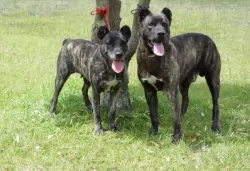 The Cao Fila de Sao Miguel is a low maintenance breed and all that will be required for him is that you give him a thorough brushing a couple of times a week.
The Cao Fila de Sao Miguel is a low maintenance breed and all that will be required for him is that you give him a thorough brushing a couple of times a week.
The Cao Fila De Sao Miguel puppy will require four meals of puppy food a day. The adult Cao fila de sao miguel can go down to 1 or 2 meals a day after his 1st birthday.
These days you get some excellent commercially manufactured dog foods and your veterinarian can help you choose one suited to this particular dog breed. Add in some home-made vegetables, rice and meat every now and then. The idea is to make sure your dog is getting in all the minerals and vitamins he needs.
There is evidence showing that dogs who enjoy raw meat every now and then enjoy a number of health benefits. Skin and teeth are improved, your dog has a shinier coat, less allergies,less inflammation and he is more relaxed and amicable. Ensure a constant supply of fresh, cool water in a clean bowl and at all times.